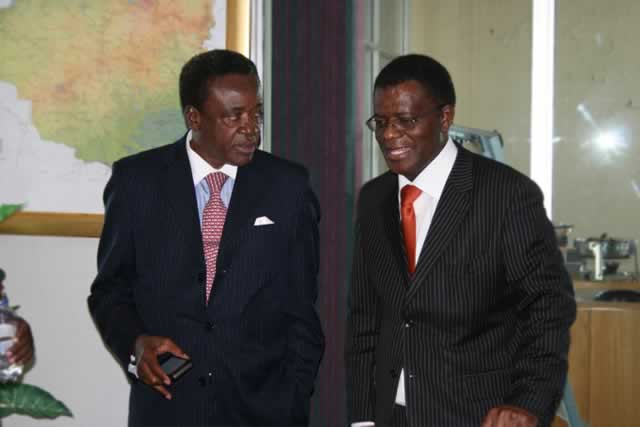
The Sunday Mail

 Information and Communication Technology, Postal and Courier Services Minister Webster Shamu with NetOne chief executive Reward Kangai
Information and Communication Technology, Postal and Courier Services Minister Webster Shamu with NetOne chief executive Reward KangaiTHE Postal and Telecommunications Regulatory Authority of Zimbabwe is largely viewed with suspicion by industry players who believe that it cannot be a fair arbiter considering that it also feeds off revenues that are generated by the companies it regulates.
Since last year, there has been enduring market speculation that the authority cannot possibly allow mobile operators in particular to markedly revise their tariffs downwards as this would negatively affect revenues accruing to the Universal Services Fund.
The USF is administered by Potraz and is essentially designed to channel investment in ICT infrastructure, especially in areas that are regarded as commercially unviable by private operators.
This is meant to bridge the digital divide.
Currently, 0,5 percent of a mobile network’s turnover is immediately captured into the fund. Potraz courted the ire of subscribers when it controversially ordered Econet to reverse its tariff reductions last year claiming that it has flouted regulations that stipulated that reductions should not be more than 50 percent.
Econet had slashed its tariffs to about 10 cents per minute from 25 cents per minute through its Buddie Zone promotion, an effective 60 percent reduction. Econet publicly grumbled about the regulator’s intervention.
“The regulator is there to create a level playing field. We are not aware of any similar order being given to other operators who are freely offering similar discounts. Even when other operators violated key conditions of their licence, we did not see any such threats being made,” seethed Econet.
But just about the same time that Econet was barred, Telecel was running its own promotion that the regulator claimed was sanctioned.
There are quarters that believe Potraz is out to ring-fence the inflows it receives to the USF.
Incidentally, last week, Potraz reportedly complained that the downward revision of contributions to the fund that had been negotiated by mobile operators had adversely affected its planned infrastructure projects.
Part of the projects that had been affected by the dwindling revenues include the US$12 million project to connect 1 000 schools, e-Government projects worth US$7 million and connectivity to rural post offices worth US$3 million.
However, Potraz is in the process of constructing plush new offices just a stone’s throw away from its Emerald Park offices in Mount Pleasant.
The total cost of this project is estimated to be US$16 million. However, Potraz said its interventions on tariffs are meant to “safeguard the interests of consumers”.
“Potraz regulates tariffs for communication service including tariffs for promotional activities. The rationale behind tariff regulation is to ensure effective competition in the market as well as safeguard the interests of consumers.
“Analysis of the tariff/promotions proposals from operators is done to ensure that they are not exploitative and discriminatory in the interest of protecting consumers and fostering competition in the market. We do not limit the number of promotions offered by operators in the market. As long as they are non-discriminatory, not anti-competitive and not misleading.”
But Potraz is also accused of handling mobile operators with kid gloves as it has not decisively moved in to ensure that they share infrastructure and open up their gateways.
It is still not possible for local subscribers to change networks while at the same time retaining their mobile number although this is now available in other markets. Equally it is still difficult for subscribers to enjoy the services of other networks as the systems are not inter-operable.
Founder of ICT blog Techzim Mr Limbikani Kabweza has said operators will naturally be reluctant to open up their platforms for obvious reasons and noted that the regulator has to be “aggressive” in making these inter-operability mandatory.
“I think operators will always be reluctant for obvious reasons of wanting to reduce the subscriber churn. These are regulatory issues and the regulator needs to be aggressive in making these things mandatory. Why would the largest operator, for example, be keen on number portability when the likely result is subscribers will easily move to competitors? Why would the network with the largest number of towers want to share infrastructure, effectively reducing the cost of network expansion for their competition? These are regulatory matters,” he said.
He further noted that voice and data prices seemed expensive when compared to the region.
“I understand POTRAZ is now at a point where they will be able to determine these costs with some accuracy though, and indeed it seems the oligopoly is finally developing cracks as witnessed by the pricing wars that started a few months ago.
“The definite thing to happen is that it will increase competition and especially now where POTRAZ is talking about mandatory infrastructure sharing, the competition will be stiffer and subscribers will be the winners ultimately.
“But an external player is likely not to happen anytime soon, unless something has changed in the past year about the possibility of NetOne or TelOne attracting a buyer/investor. Or maybe if Telecel Zimbabwe is sold, a possibility that was mentioned a bit last year before it too vanished,” explained Mr Limbikani.



